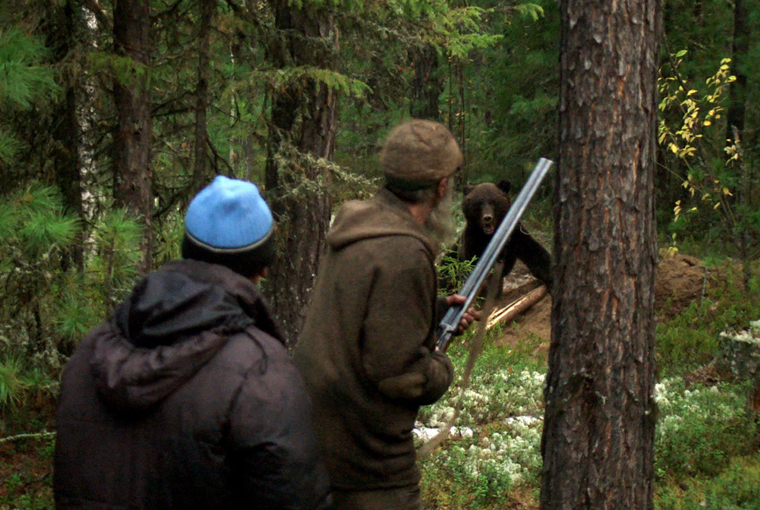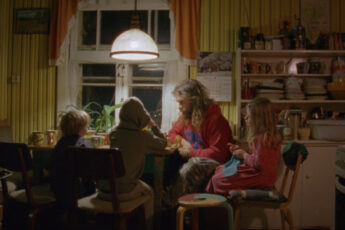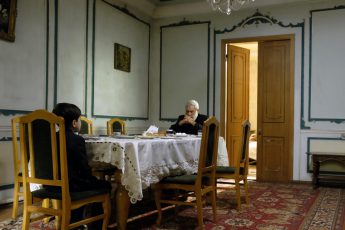
Braguino, a 47-minutes documentary by Clément Cogitore, is a spellbinding tale of this huge country, the biggest in the world, where even a family living in the middle of nowhere, in the profound taiga, cannot be left in peace and finds itself in the middle of a territorial conflict.
There is a river, Sim, and there are two families living on it: the Bragins and the Kilins. And long kilometers of pristine nature around. Although the Bragins had come there first, they have finally started to adapt themselves to their new neighbors. But nothing is enough for the Kilins who constantly continue to occupy the Bragins’ lands. To reinforce their position the Kilins bring in so-called “crooks”, who are really just rich criminals eager to hunt in the taiga and who don’t care whose territory they’re treading. They come on helicopters, armed to their teeth, and respond to quiet inquiries from the Bragins with insults and menaces. Why hunt there and not elsewhere – is the taiga not big enough for all? Why be so disrespectful, so insolent? And the response of the “crooks” is an old-school Dostoevskyan formula: “Because I can!”
The tension between the two families is rendered almost tangible by the tepid air filled with hordes of midges. The silent scenes centered around the Bragins’ and Kilins’ children playing on the river bank, throwing cautious glances at each other from across the other side of river, increase the stakes, as even children seem to participate in war. The animosity sensed instinctively by the very small ones is all the more flagrant in that they don’t understand its nature.
While the Bragins are the main narrators of the story, the Kilins’ hostility is bolstered by the complete absence of their speech in film – their refusal of the dialogue, their almost predatory silence. At the same time, it is clear that they are less strong and less adapted to nature and, as the Bragins joke, “they are afraid of bears”. This cowardice also seems to be the reason for their “foul play” of inviting “crooks” for their defense. Being strangers to this land, they try to make it a land of strangers.
In following the Bragins’ daily occupations, the camera offers multiple images of crude beauty that support the main intrigue: a bear hunt, a dog barking in the dark, kids plucking dead ducks, the old Bragin using a barrel of a gun as a bugle, a girl playing in the sand in slippers made of bear’s paws. People living on the outskirts of civilization have no law to obey, but also no law to protect them. Their vulnerability can either raise their concern for each other – or provoke fear and hostility. The thin line between these two ways is a line which lies, as the river Sim does, between the Bragins and the Kilins.
There is a moment in the film when the brilliant simplicity of people’s metaphoric language crosses the path of high poetic culture. Talking of “crooks” and Kilins, the old Bragin says: “they’re of one blood… wolf’s blood”. Almost a century before, in 1931, poet Osip Mandelstam wrote:
On my shoulders pounces the wolf-hound age,
But I am no wolf by my blood;
Thrust me, instead, like a hat up the sleeve
Of the Siberian steppe’s warm fur coat,
So I can’t see the coward or the soft bit of grime
Or the bloodied bones on the wheel;
So that all night the blue-fox furs might shine
For me in their primeval beauty.
Lead me into the night where the Yenisei flows
And the pine reaches up to the star,
Because I am no wolf by my blood
And only my equal will kill me.1
Sensing the beginning of The Great Terror, Osip Mandelstam begged to be sent to the depths of Siberia, far from Moscow “wolves”.
And so the wolves came there.




Leave a Comment